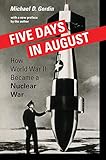Five Days in August : How World War II Became a Nuclear War / Michael D. Gordin.
Material type: TextPublisher: Princeton, NJ : Princeton University Press, [2015]Copyright date: ©2015Description: 1 online resource (232 p.) : 2 halftones. 5 mapsContent type:
TextPublisher: Princeton, NJ : Princeton University Press, [2015]Copyright date: ©2015Description: 1 online resource (232 p.) : 2 halftones. 5 mapsContent type: - 9780691168432
- 9781400874439
- 539.7092
- D767.25.H6
- online - DeGruyter
- Issued also in print.
| Item type | Current library | Call number | URL | Status | Notes | Barcode | |
|---|---|---|---|---|---|---|---|
 eBook
eBook
|
Biblioteca "Angelicum" Pont. Univ. S.Tommaso d'Aquino Nuvola online | online - DeGruyter (Browse shelf(Opens below)) | Online access | Not for loan (Accesso limitato) | Accesso per gli utenti autorizzati / Access for authorized users | (dgr)9781400874439 |
Frontmatter -- Contents -- Illustrations -- Preface to the Paperback Edition -- Acknowledgments -- Chronology -- Chapter 1. Endings -- Chapter 2. Shock -- Chapter 3. Special -- Chapter 4. Miracle -- Chapter 5. Papacy -- Chapter 6. Revolution -- Chapter 7. Beginnings -- Coda: On the Scholarly Literature -- Abbreviations Used in Notes -- Notes -- Index
restricted access online access with authorization star
http://purl.org/coar/access_right/c_16ec
Most Americans believe that the Second World War ended because the two atomic bombs dropped on Japan forced it to surrender. Five Days in August boldly presents a different interpretation: that the military did not clearly understand the atomic bomb's revolutionary strategic potential, that the Allies were almost as stunned by the surrender as the Japanese were by the attack, and that not only had experts planned and fully anticipated the need for a third bomb, they were skeptical about whether the atomic bomb would work at all. With these ideas, Michael Gordin reorients the historical and contemporary conversation about the A-bomb and World War II.Five Days in August explores these and countless other legacies of the atomic bomb in a glaring new light. Daring and iconoclastic, it will result in far-reaching discussions about the significance of the A-bomb, about World War II, and about the moral issues they have spawned.
Issued also in print.
Mode of access: Internet via World Wide Web.
In English.
Description based on online resource; title from PDF title page (publisher's Web site, viewed 30. Aug 2021)


